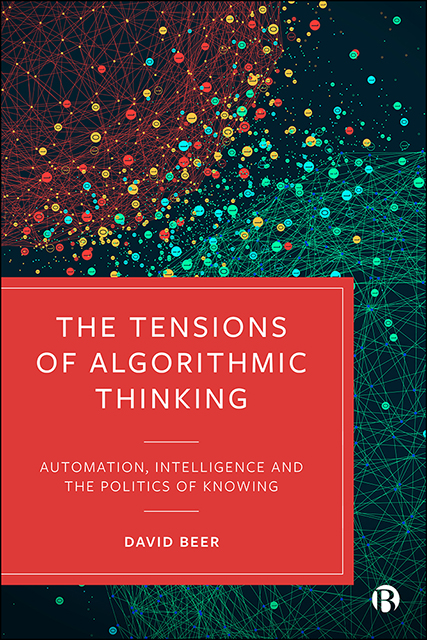Book contents
- Frontmatter
- Dedication
- Contents
- Acknowledgements
- 1 Introduction: Tense Thinking and the Myths of an Algorithmic New Life
- 2 The Pursuit of Posthuman Security
- 3 Overstepping and the Navigation of the Perceived Limits of Algorithmic Thinking
- 4 (Dreaming of) Super Cognizers and the Stretching of the Known
- 5 The Presences of Nonknowledge
- 6 Conclusion: Algorithmic Thinking and the Will to Automate
- References
- Index
6 - Conclusion: Algorithmic Thinking and the Will to Automate
Published online by Cambridge University Press: 21 June 2023
- Frontmatter
- Dedication
- Contents
- Acknowledgements
- 1 Introduction: Tense Thinking and the Myths of an Algorithmic New Life
- 2 The Pursuit of Posthuman Security
- 3 Overstepping and the Navigation of the Perceived Limits of Algorithmic Thinking
- 4 (Dreaming of) Super Cognizers and the Stretching of the Known
- 5 The Presences of Nonknowledge
- 6 Conclusion: Algorithmic Thinking and the Will to Automate
- References
- Index
Summary
Algorithmic thinking is both elusive and everywhere. It is hard to see and impossible to avoid. While having significant power and influence, it is so intricately connected into social structures and everyday experiences that it goes almost unnoticed. Very little resides outside or untouched by algorithmic thinking and, crucially, its tensions. Acknowledging this hypedup incorporation and unbending inescapability, Rosie DuBrin and Ashley E. Gorham (2021) have written of a form of ‘algorithmic interpellation’. To engage with the social world is, frequently, to be interpellated into some form of algorithmic process. We are hailed by algorithmic systems; resisting the temptation to turn to face them is not really an option. Given this context, I’m not even sure that a complete or definitive understanding of contemporary algorithms and algorithmic thinking is possible. And anyway, any attempt to do so is likely to miss the dynamism and sheer variability of the issues and consequences. Alongside this, algorithmic thinking and algorithmic systems never seem to settle into place for long enough to be fully grasped. They are on the move, they change, they mutate and they are coded and recoded. The ideals of continual supposed advancement are built into them; they are codified in their very form. Even if algorithmic thinking were to freeze for long enough for a stable depiction to be sketched, the many different forms of algorithmic thinking would be too vast and contested to be fully mapped. As a result, any such picture is always likely to be incomplete and is always likely to miss the pulsing mobilities, momentums and dynamics of what automation and its various processes might incorporate or entail.
Shifting the focus to concentrate on this very mobility and dynamism is one way to proceed. In the case of this book, rather than seeing algorithmic processes as a fixed object of study I have instead taken some of the tensions of algorithmic thinking as my focus. This approach affords a perspective on the relational aspects of automation, the forces and frictions that define its forms and the ideals and future trajectories that are bound up within it.
- Type
- Chapter
- Information
- The Tensions of Algorithmic ThinkingAutomation, Intelligence and the Politics of Knowing, pp. 124 - 132Publisher: Bristol University PressPrint publication year: 2022

